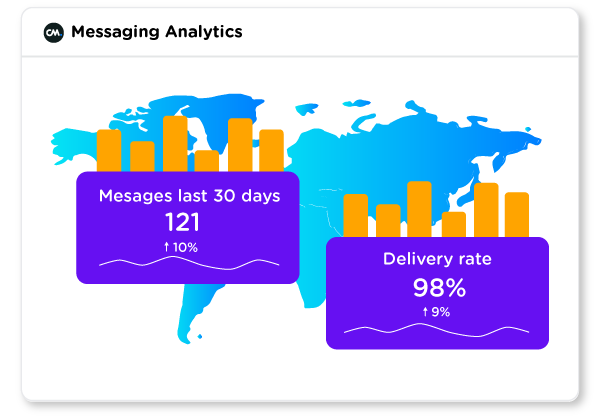When robust communication is literally life or death, who do you rely on? We asked Crises Control’s Shalen Sehgal, Vittoria Nicastro and Michal Bauernfreund.
SMS by CM.com“Our vision is to democratise emergency communications. To give everyone the capability to mass communicate.”
Crises Control is a mass communication company that facilitates fast and effective emergency communications. Its mission is to simplify managing crises and help to minimise the impact to the organisation. The smart thing about the system is that it knows the best way to contact individual people in its distribution list based on a variety of factors, such as time, language and location. Once each person has confirmed they’ve received and understood the message, Crises Control stops attempting to contact them.
“We’re a truly global business,” says, Managing Director, Shalen Sehgal, “we have customers in a lot of countries and in a lot of different industries and our value proposition is truly industry agnostic in that we can add value to any industry.
“When there’s been a major critical event – for example, there's been a cyber attack in the organisation, or there's been a terrorist incident – and something urgent needs to be said, then it generates a need for an organisation to do two things. Firstly, to notify people initially and as soon as possible that something has happened, but also to keep them up-to-date as the event unfolds. Secondly, to compile and assign a list of tasks. Essentially when the problem occurs, there’s usually a group of individuals that need to complete a number of tasks to fix that problem, or at least minimise the associated damage.
“So the two core things that we help an organisation do are to get the message out, and to keep the information flowing consistently.”
“I think there is a great synergy with CM.com because they have a bespoke approach to servicing customers with a high level of care and attention, just as we do."
Crises control uses a combination of voice, email, messaging and SMS to get messages to its recipient’s database when a critical event occurs, but as Crises Control’s customer base grew, GDPR began to cause some challenges. Today, the flow of customer data (PII) is tightly controlled within the EU and other specific regions. One of Crises Control’s incumbent partner’s servers were based in the US. That’s where CM.com came in.
“We chose CM.com because our previous provider was primarily US-based,” explains Executive Director Vittoria Nicastro, “and this was creating a problem with implementation within the European Union, because they're particularly sensitive to data privacy and customer data isn’t allowed to leave the EU. CM.com’s servers are all located at its HQ in the Netherlands, so we started implementing the SMS element and it was very successful – our developers collaborated really effectively with the CM.com team.
“I really like the fact that we have constant communication. We’d never experienced that with past providers – they all had a pretty standardised approach with all of their customers, so you didn't really feel loved. But with CM.com it's different.”
“What we're trying to do here is work in partnership with our suppliers,” adds Michal Bauernfreund, Marketing Specialist “and it's important to us that we all see the value in everything that we do, and that if they serve us well, we serve our customers well, and then everybody benefits at the end of the day.”
Given the huge number of countries Crises Control is active in, knowledge of national infrastructure limitations is essential to ensure reliable communications.
Sam Windridge, Business Development Manager, CM.com explains, “Our system can easily handle maybe five to six thousand Texts Per Second (TPS), but sometimes we have to throttle back on throughput because the carrier infrastructure in a specific region isn’t capable of handling the volume of traffic. So we'll reduce that to, say, 200 TPS to ensure there's that balance between speed and dependability. And that's where we're ultimately more reliable, because we know the infrastructure that’s on the ground in each region.”
“Crises Control are the safety net for some very large enterprises who rely on their infrastructure to look after their people. That they chose CM.com to support that infrastructure isn’t something we take lightly.”
With SMS now successfully integrated into Crises Control’s offering, what’s the next channel for this partnership?
“WhatsApp could be another channel for us. Certain countries around the world rely on Whatsapp as a comms [communication] channel more than SMS” continues Shalen, “if we can easily offer a larger portfolio of channels to our customers – if we could say instead of having to phone, text, email or notify people via the app, you could also WhatsApp them, that could be very useful.”
So with big plans afoot, Crises Control is going from strength-to-strength. While COVID is currently on the back foot in the UK, it’s not necessarily the case elsewhere in the world. With that in mind, we asked if the pandemic has changed the landscape for Crises Control?
“At a global level, the risk has always been dynamic and growing,” replies Vittoria, “but companies didn't take preparation as seriously, and now COVID has changed the way we live, unfortunately. I believe that a lesson has been learned and a lot of new trends, like working remotely and the increased use of technology, will remain.
“If we look at the next five years, I wouldn't be surprised to have whole teams based in different parts of the world, not working from the office, and companies taking the preparation for this kind of emergency much more seriously. This is now part of our future.”
Our SMS platform helps your business to succeed. Keep customers engaged and informed. Reach your target audience worldwide and increase conversion and service.
Send and Receive SMS Messages Worldwide
One Clear Dashboard for All Configuration and Analytics
Secure and Reliable, 24/7/365 Support
Select a region to show relevant information. This may change the language.

